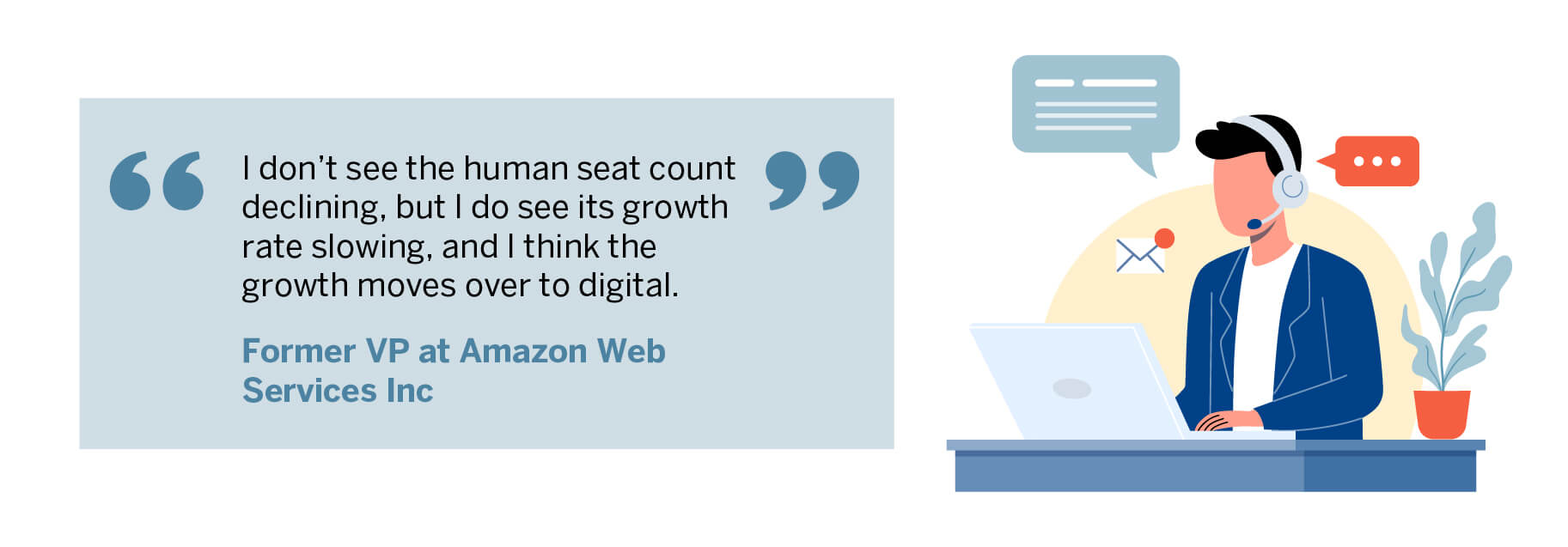The surge in cloud-based services and shift to remote working during the COVID-19 pandemic have turbocharged contact centre-as-a-service (CCaaS) market demand. At the same time, many businesses are looking to sharpen their communication capabilities across a range of channels to strengthen customer relationships and acquire new ones.
Although the CCaaS market is a crowded space, we have heard there is room for innovation — and it is certainly happening. Video is an area that both consumers and businesses increasingly look to for a more personal level of service. Exemplifying this, Zoom has launched its own CCaaS solution, Zoom Contact Centre.
“I’ve seen numbers as high as USD 340bn in total contact centre spend in the past year,” a former VP at Amazon Web Services (AWS) told Third Bridge Forum. “They’re big numbers, we know that.” Estimated TAM for CCaaS is already considerable at USD 24-25bn, but when taking into account AI and automation momentum, some argue USD 59bn is more accurate. Indeed, the former AWS executive said USD 24-25bn “makes sense from a traditional market contact centre perspective, but underestimates cloud opportunities”.
Against this backdrop, Interviews with industry experts point to “fierce competition” among CCaaS providers, with businesses spending more time scrutinising their value for money. “Customers are looking more at the companies that can provide end-to-end integration with their selected UCaaS platform,” a divisional leader at Vodafone Group plc told us.
Digital sophistication is becoming a significant differentiator and already complements existing human-based roles. Although AI-facilitated CCaaS and customer engagement-as-a-service are, in some ways, reducing the need for human-based interaction, our experts say many roles are likely to evolve rather than become redundant. “I don’t see the human seat count declining, but I do see its growth rate slowing, and I think the growth moves over to digital,” the former VP at AWS said. “I think human interaction will become more sophisticated here, less mechanical.” Requests for account balances and order updates will eventually be digital-only across the board, our Interviews suggest – with AI used for screening and redirecting.

This digital transformation, particularly in cloud services, is more challenging for on-premise vendors to embrace given their depth of traditional legacy platforms. “It’s hard to throw away all that sunk cost, but I think that’s what you’ve got to do when you’re a vendor sitting in the spot where the world is [in] a big transition around this market,” the former AWS executive said. While some are focusing on successfully transitioning to the cloud, a full leap to AI seems further down the road. “I think they’re going to have to get there, and this may be a place where we see acquisitions in the market.” Our experts anticipate consolidation across an array of call centre technologies, particularly as many customers prefer working with a single vendor rather than managing disparate systems.
But even as incumbents bolster their digital capabilities, experts see technology giants such as Microsoft – which has announced plans to launch a CCaaS product – and Amazon as a growing threat to the market. “There’s a move to voice being IP-based and telephony all being IP-based,” the former AWS executive added. “All of those things create opportunities for a vendor like Microsoft to step into this.”
As we heard in another Interview, it’s going to get “tougher and tougher” for smaller players such as Twilio to “keep making sure that they are fighting with a lot of additional features”. The divisional leader at Vodafone said these behemoths are “destroying” the market in terms of pricing and putting companies including RingCentral, Five9 and 8×8 under significant pressure. Amazon Connect, for example, charges USD 0.018 per minute with no upfront costs. “That’s a huge differentiator,” the specialist said. Although some customers prefer the predictability of the per-seat model, they believe that the flexibility of consumption-based approaches means “a lot of people are going to buy into this”.
We were also told that traditional CRM players and CCaaS providers can co-exist, as they “bring different things to the table”. While traditional CRM, and sales enablement tools, focus on workflows, contact centre technologies offer specific communications and omnichannel capabilities, as well as integrated telephony. “I do think you see vendors from both spaces beginning to move towards each other a bit,” the former VP at AWS said. “You see this in some of the vendors as they begin to overlap in some of what they do there, but I think there’s probably a long time before those become mutually exclusive choices.”
Ultimately, the CCaaS market is expanding — but it is also transforming and the competitive landscape is heating up. We were told the industry at large is in the early stages of its shift from on-premise to cloud CCaaS and cloud-based business is expected to drive growth as this transition progresses.
With hybrid or flexible working now an embedded feature of many business operations, the need for secure cloud-based communication tools is only increasing. As such, our experts also see greater opportunity in the SMB space. “There are a lot more 50-seat call centres, or just small businesses… where you’ve got a dozen salespeople and you want to route calls across them,” the AWS executive said. “You can do that with a cloud contact centre service that you could never do in the traditional on-prem world.”
The information used in compiling this document has been obtained by Third Bridge from experts participating in Forum Interviews. Third Bridge does not warrant the accuracy of the information and has not independently verified it. It should not be regarded as a trade recommendation or form the basis of any investment decision.
For any enquiries, please contact sales@thirdbridge.com




